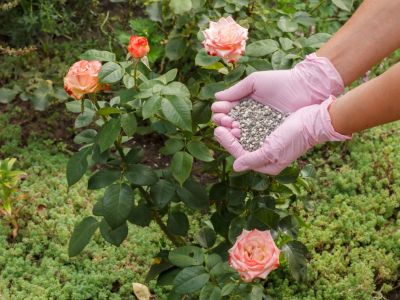Choosing the Best Rose Fertilizer
There are just about as many rose fertilizers or foods available on the market currently as anyone could think up a name for. Some of the rose fertilizers are organic and will not only have food for the rose bushes in the mix but also materials that enrich the soil. Enriching the soil as well as taking good care of the microorganisms that dwell in the soil is a very good thing! Healthy, well-balanced soil provides the key for the root systems to take up all the required nutrients they need, thus creating a healthier, more disease-resistant rose bush. Most chemical rose fertilizers have what is needed for the rose bush but need a little help with the materials to enrich and build the soil. Using some alfalfa meal along with the fertilizer of choice for feeding roses is a great way to give both the rose bushes and the soil some important nutrients. Rotating the type of chemical rose fertilizer used for fertilizing roses is recommended as well, continually using the same fertilizer can lead to a build up of unwanted salt in the soil. Making sure that you maintain good soil drainage around your roses or throughout your rose bed will help prevent this build up. Along with adding the alfalfa meal at the time of first spring feeding or my last feeding of the season, which is no later than August 15th in my area, I will add 4 or 5 tablespoons (59-74 ml.) of superphosphate, but do not use the triple superphosphate for this as it is too strong. Epsom salt and kelp meal given to the rose bushes between regular feedings can bring about bonus results. In my opinion, you want to look for a rose fertilizer that has a well-balanced NPK rating no matter what brand or type it may be. In the water-soluble types, I have used Miracle Gro for Roses, Miracle Gro All Purpose, and Peters All Purpose. All of them seem to do well with not a lot of difference in the performance of the rose bushes. I do not use any of the special Bloom Booster mixes when fertilizing roses, as they can be too high in the nitrogen area, thus more foliage growth and actually less bloom production. A quick note here about the NPK ratios given on the various rose fertilizers: the N is for up (top part of the bush or plant), P is for down (the root system of the bush or plant), and K is for all around (good for the entire bush or plant systems). All of them together make for the mix that will keep the rose bush healthy and happy. Making the decision as to which product to use for fertilizing roses becomes one of personal choice. When you find some products that work well for your feeding program rotation, stick with them and do not worry about the latest hype over new products for fertilizing roses. The main thing when feeding roses is to keep the rose bushes well fed and healthy so that they have plenty of stamina to make it through the winter/dormant season.
